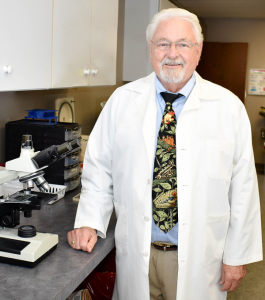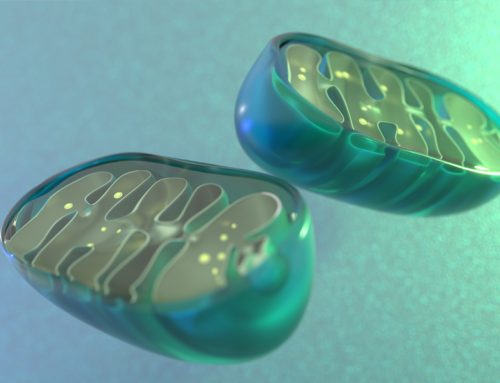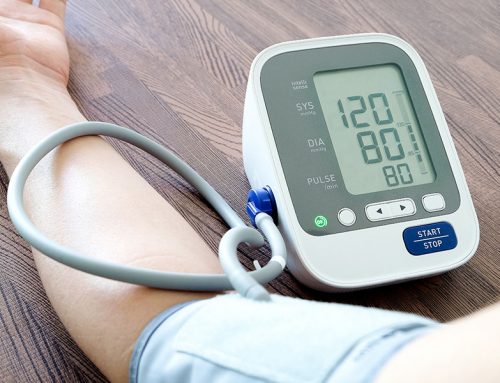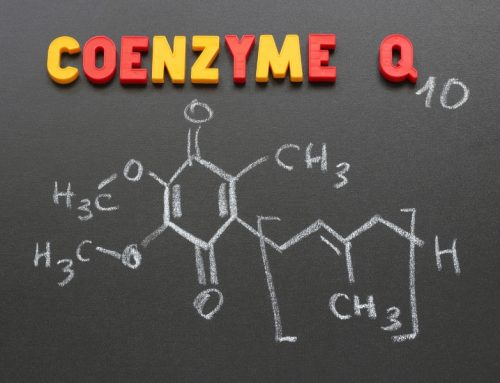
Dr. William V. Judy, Founder and President of SIBR Research, has done basic and clinical research into the safety, absorption, and health effects of Coenzyme Q10 supplementation for 40 years. His research has documented significant health benefits of CoQ10 supplements in patients with heart failure, chronic fatigue syndrome, and heart surgery.
As we get older, the risk of heart disease increases. There are two basic explanations for this increasing risk:
- Mitochondrial dysfunction
- Oxidative stress
Mitochondrial dysfunction
The mitochondria are the tiny “powerhouses” in our cells. They are organelles with their own DNA. They produce almost all the energy that our cells need to live and work.
A slow degeneration of the quality of the mitochondria seems to be a cause of ageing and a cause of many of the degenerative diseases that come with ageing [Know 2018].
It is in the mitochondria that the food we eat is processed together with the oxygen we breath to make cellular energy, ATP energy.
CoQ10 a vital factor in cellular energy production.
Coenzyme Q10 is a vital co-factor in this process of producing cellular energy. The study of this process is called bio-energetics. Without adequate Coenzyme Q10, the process breaks down.
Note: Coenzyme Q10 is a vitamin-like fat-soluble substance that is synthesized in almost all cells of the human body. However, with increasing age above the age of 35 or 40, the body’s bio-synthesis of CoQ10 declines.
We cannot make up the loss of CoQ10 by eating more or eating better. A good CoQ10 supplement is a necessity.
If mitochondrial function is compromised by inadequate levels of CoQ10, then the result will be weakness, fatigue, and increased risk of heart disease and stroke [Know 2018].
Oxidative stress
Our processing of food and oxygen to make cellular energy is seldom 100% efficient. Inevitably, some electrons escape in the process, and harmful superoxide radicals and hydrogen peroxide radicals form.
Admittedly, a certain level of free radicals is needed for cell signaling purposes and for the maintenance of cell homeostasis.
However, high levels of free radicals unquenched by antioxidants result in free radical chain reactions that damage cells, lipids, proteins, and DNA.
Too much cumulative cellular damage by harmful radicals is called oxidative stress.
Oxidative stress is implicated in most processes known to have a harmful effect on heart function [Yang 2015].
Hydrogen peroxide radicals induce increased lipid peroxidation. Lipid peroxidation is the oxidative degradation of fats in the body.
The reduced form of CoQ10, known as ubiquinol, is a fat-soluble antioxidant that intervenes to prevent the formation of lipid peroxide radicals [Yang 2015].
Clinical evidence of CoQ10 protection
Heart Failure
CoQ10 supplementation works to reduce the risk of heart failure and to improve the symptoms and survival of heart failure patients in three basic ways [Yang]:
- Improvement of heart muscle bio-energetics
- Antioxidant activity in heart muscle tissue
- Anti-inflammatory activity in heart muscle tissue
Clinical studies have shown the following beneficial effects of adjunctive treatment of chronic heart failure with Coenzyme Q10 supplements in daily dosages from 150 to 300 milligrams [Yang]:
- Net improvements in ejection fraction (= percentage of blood pumped from the heart with each contraction)
- Reductions in complications and hospitalizations
- Clinical improvement in cyanosis, edema, pulmonary rales, dyspnoea, palpitations, and arrythmia
Hypertension
CoQ10 supplementation plays an important role in blood pressure regulation in three ways [Yang]:
- Antioxidant activity
- Preservation of nitric oxide
- Improved production of the prostaglandin prostacyclin
Clinical studies have shown that Coenzyme Q10 supplementation is associated with lowered systolic and diastolic blood pressure when used as an adjunct to conventional hypertension agents such as diuretics and ACE inhibitors [Yang].
CoQ10 supplementation does not have a vasodilatory or hypotensive effect in healthy animals or humans. The hypotensive effect of CoQ10 supplementation seems to be specific to the condition of increased oxidative stress in hypertensive patients [Yang].
Endothelial function
Coenzyme Q10 has been shown to improve endothelial function in patients with coronary artery disease, heart failure, and diabetes [Yang].
The endothelium is the bio-medical term for the single layer of cells lining the inside of the blood vessels, the lymph vessels, and the heart.
Endothelial dysfunction is the bio-medical term for the deterioration of the endothelium leading to impaired dilation of blood vessels, increased inflammation, and increased risk of forming blood clots.
Adequate levels of CoQ10 help to prevent the development of endothelial dysfunction by preventing oxidative stress and inflammation [Yang].
Conclusion: CoQ10 protects against cardiovascular disorders
Low CoQ10 levels are associated with increased risk of congestive heart failure, coronary artery disease, angina pectoris, and hypertension [Yang].
Randomized controlled trials have shown that adjuvant treatment with CoQ10 benefits heart failure patients [Mortensen, Munkholm, Morisco].
A randomized controlled trial has shown that combination supplementation with CoQ10 and a high-selenium yeast helps senior citizens maintain good heart health [Alehagen].
Read our key article on CoQ10 as adjuvant therapy for heart failure
Sources
Alehagen, U., Johansson, P., Björnstedt, M., Rosén, A., & Dahlström, U. (2013). Cardiovascular mortality and N-terminal-proBNP reduced after combined selenium and Coenzyme Q10 supplementation: a 5-year prospective randomized double-blind placebo-controlled trial among elderly Swedish citizens. International Journal of Cardiology, 167(5), 1860-1866. doi:10.1016/j.ijcard.2012.04.156
Alehagen, U., Aaseth, J., Alexander, J., & Johansson, P. (2018). Still reduced cardiovascular mortality 12 years after supplementation with selenium and coenzyme Q10 for four years: A validation of previous 10-year follow-up results of a prospective randomized double-blind placebo-controlled trial in elderly. Plos One, 13(4), e0193120. doi:10.1371/journal.pone.0193120
Know, L. (2018). Mitochondria and the Future of Medicine. White River Junction, VT: Chelsea Green Publishing.
Morisco, C., Trimarco, B., & Condorelli, M. (1993). Effect of coenzyme Q10 therapy in patients with congestive heart failure: a long-term multicenter randomized study. The Clinical Investigator, 71(8 Suppl), S134-S136.
Mortensen, S. A., Rosenfeldt, F., Kumar, A., Dolliner, P., Filipiak, K. J., Pella, D., & Littarru, G. P. (2014). The effect of coenzyme Q10 on morbidity and mortality in chronic heart failure: results from Q-SYMBIO: a randomized double-blind trial. JACC. Heart Failure, 2(6), 641-649.
Munkholm, H., Hansen, H. H., & Rasmussen, K. (1999). Coenzyme Q10 treatment in serious heart failure. Biofactors (Oxford, England), 9(2-4), 285-289.
Yang, Y.-K., Wang, L.-P., Chen, L., Yao, X.-P., Yang, K.-Q., Gao, L.-G., & Zhou, X.-L. (2015). Coenzyme Q10 treatment of cardiovascular disorders of ageing including heart failure, hypertension and endothelial dysfunction. Clinica Chimica Acta; International Journal of Clinical Chemistry, 450, 83–89. https://doi-org.db14.linccweb.org/10.1016/j.cca.2015.08.002
The information presented in this review article is not intended as medical advice and should not be construed as such.









Leave A Comment